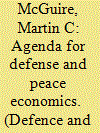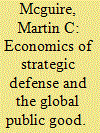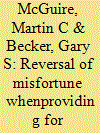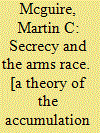| Srl | Item |
| 1 |
ID:
100963


|
|
|
|
|
| Publication |
2010.
|
| Summary/Abstract |
This brief introduction celebrates the 20th Anniversary of the Journal, Defence and Peace Economics. Suggesting elements of an agenda for the future of this branch of economics, I raise several topics that are new and that seem to indicate that the field will expand and shift focus substantially in future years.
|
|
|
|
|
|
|
|
|
|
|
|
|
|
|
|
| 2 |
ID:
050276


|
|
|
| 3 |
ID:
075803


|
|
|
|
|
| Publication |
2006.
|
| Summary/Abstract |
Often an economic agent dissatisfied with an endowed distribution of utilities desires to optimize this distribution by transferring income or resources across individuals or states of the world. This multi?state optimization theme recurs in a wide variety of economic contexts, ranging across taxation and income distribution, international trade and market disruption, labor contracts and unemployment insurance, Rawlsian design of social contracts, provision for retirement, and many others. Because analyses of such topics are frequently so context driven, the generality of this theme seems to have gone unnoticed and, of a particular paradoxical result, unappreciated. One example of this paradox is how lump?sum distribution in a first best environment will reverse the preference rankings of the endowed distribution of utilities - after redistribution the originally 'bad' outcomes become preferred to originally better ones. Or as another example, if fair insurance is available, the rational resource owner will buy so much insurance that the otherwise 'bad' contingency becomes preferred. This paper examines the underlying structure common to such contexts.
|
|
|
|
|
|
|
|
|
|
|
|
|
|
|
|
| 4 |
ID:
061615


|
|
|
|
|
| Publication |
Cambridge, Harvard University Press, 1965.
|
| Description |
249p.
|
| Series |
Harvard economic studies; v. 125
|
|
|
|
|
|
|
|
|
|
|
|
Copies: C:1/I:0,R:0,Q:0
Circulation
| Accession# | Call# | Current Location | Status | Policy | Location |
| 000067 | 355.82/MCG 000067 | Main | On Shelf | General | |
|
|
|
|
| 5 |
ID:
074967


|
|
|
|
|
| Publication |
2006.
|
| Summary/Abstract |
Recent international conflicts have resurrected concerns about how to manage supply disruptions or sudden escalation of need for energy, and other critical imports such as vaccines or military components. Prominent proactive measures include support of domestic production and accumulation of reserves or maintenance of stand?by production. This paper develops a clear transparent method for comparing instruments and for identifying the optimum policy mix. We show how a country's risk aversion influences the best mix of policies and interacts unexpectedly with the degree of risk itself. Specifically, high?risk aversion and low risk are shown to favor domestic production support as the better defense, and to disfavor stockpiling (and vice versa). In clarifying a country's best policy response to risks of supply interruption, this analysis predicts how income level and risk aversion characteristics should shape arguments for and against interference with free trade on grounds of 'national security.'
|
|
|
|
|
|
|
|
|
|
|
|
|
|
|
|